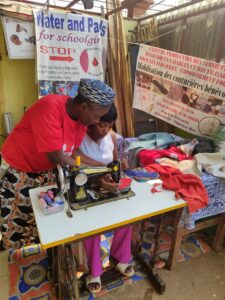A world in turmoil
-The world we are living in is a world in turmoil. Years of austerity and neo-liberal market liberalization policies have had as a result the current backlash for women’s rights and gender equality.
– The rise of authoritarian and nationalistic governments, as well as right wing populist, xenophobic and anti-feminist forces pose a severe threat to liberal democracy and gender equality. Austerity policies download a lot of costs on women and the economy.
– We have to face a lot of challenges in the external environment: Fundamentalism, increased number of refugees and displaced persons, climate change, structural inequality, the erosion of democratic institutions.
COVID-19 and its impact on women
– We are today 25 years after the Beijing Platform for Action was adopted in Beijing which took place when a new world order of cooperation was emerging after the end of the Cold War and a lot of optimism was prevailing.
-The anniversary of Beijing coincides with a new world order which has been imposed to us by the Pandemic of COVID-19 and which makes us feel as if our world has come upside down.
– Because of their weaker position within the labor market, the economic impacts of the pandemic are harder on women than men.
– Covid-19 has exacerbated inequalities. Women’s frontline roles as health workers, in service industry and in the care economy have become more visible as they constitute the backbone of the COVID-19 response of society.
– The gaps in care provisions exposed by this crisis demonstrate the urgency of moving towards a socioeconomic model that recognizes women’s invaluable contributions to society and places care at the center.
– We know from past experiences, when crises hit, violence against women and girls gets worse. From Argentina to the UK and Tunisia providers of hotlines, shelters and online resources have reported an increase in demand between 25% and 500%.
What can we do
– We need new concepts to bring into the heart of the understanding of the economy. Feminist economists, recommend a caring economy with care work at its center to accelerate the wealth and resilience of all human beings in all societies. Care economy is one such concept. Reproductive economy is another one.
– Care simply put is the act of caring for others and for oneself. Care work is central to the process of social reproduction that enables the continued existence of individuals, families and society itself. Care represents a key to the continuation of the social order.
– The unequal distribution of caring responsibilities is linked to discriminatory social institutions and stereotypes and norms on gender roles.
– The fact that care work is not equally shared between women and men has a direct negative impact on women’s ability to participate in all aspects of social, economic and political life including on line. Only 20% of professionals in AI are women. Women are not welcome in online public space.
– Care is not about dependency, but about autonomy, embedded in a human-rights based approach. The right to be cared for and care for others requires addressing the needs and the rights of all at different stages of our lives. An example is the call of IAW for a co-design approach with civil society organizations of robotics in long term care.
Characteristics of feminist economics:
– Feminist economists analyze the interrelationship between gender and the economy. Feminist economists see power relations driving social and economic dynamics. They analyze capitalism and patriarchy as interrelated forms of dominance. Power relations articulate themselves in the form of low payment, gender pay gap or in the double burden of women. Feminist economists argue that the described patterns depend on social role models of women that are socially negotiated rather than a result of market forces as classical economists believe.
– Feminist economists criticize the neoclassical concept of the homo-economicus and they argue that individuals cannot be considered detached from the social context which significantly influences their identity.
– The IAW Board should ask our members to lobby their governments, in order to take into account, the following:
Policy Recommendations concerning our economy
- Reshaping our economy by taking a feminist approach
– Take full account of the contribution that women are already making to the economy. / Strive for the well-being of women and men, girls and boys at all levels /ensure decent work conditions for all workers across all care sectors/. /Take a care centered approach investing in public services of quality and accessible as well as universal social protection and comprehensive public infrastructure/. Embrace feminist values like solidarity, equality, non-discrimination with particular attention to intersectionality / Value unpaid work, accountability and transparency / Offer a holistic approach linking economies to well-being and consider everybody’s activities as contributing to the economy.
– A gender mainstreaming and human rights approach needs to be incorporated in all financial policies and institutions.
– In conclusion, according to feminist economics, the economy should be redefined, on the basis of how society is or might be organized to meet people’s needs and wants and thus to reproduce itself.
- Gender inequality in unpaid care work is the missing link in the analysis of related to gender gaps in labour outcomes:
- a. Unpaid care work and female labour force participation. The amount of time devoted to unpaid care work is negatively correlated with female labour force participation.
- Unpaid care work and equality of employment. The unequal amount of time spent by women on unpaid care work increases the probability that they will be engaged in part time or in vulnerable employment.
- Unpaid care work and gender wage gaps.
In countries where women spend a large amount of time on unpaid care work and there is a large gender gap in time spent, the gender gap in hourly wage is also higher.
- The role of social norms in explaining gender inequalities.
- Where social institutions discriminate highly against women, women’s role in society is restricted to reproductive and domestic functions, with women performing more unpaid care work than men.
- When discrimination in social institutions is lower, the distribution of caring responsibilities between gender is more equal, a fact which encourages gender roles to evolve allowing for the share of unpaid care work to be redistributed between the genders.


